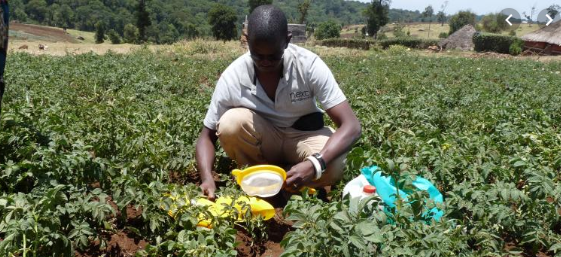Pests are a big nuisance to farmers because, among other things, they reduce crop production.
To overcome the problem, farmers often resort to buying pesticides which are poisonous chemicals manufactured to kill the pests.
They may be dusted or sprayed on the crop to prevent pest attack.
The farmer, is however, expected to know that it is extremely important to follow the manufacturer’s instructions when applying the pesticides.
If they are applied to crops such as tomatoes or other vegetables in heavy doses they can be harmful to the people that consume the items.
Innocent insects and animals which we need to preserve the environment like bees, butterflies, worms, and lizards may get killed by the pesticides. We need bees to enhance pollination.
Pesticides may kill worms which would be useful in aeration of the soil and decomposition of organic matter.
Some pesticides sink into the soil and get absorbed by food crops.
Yet this is food for humans and farmed animals.
This was revealed during the National stakeholders and scientific dialogue on pesticides use held at Africana hotel in Kampala which was organized by Uganda National Association of Community and Occupational Health (UNACOH)
According to a study conducted by the experts that convened at the dialogue, only one out of 4 small holder farmers had received relevant training on pesticide use while the rest used it without adequate knowledge that would be Essential in ensuring both human and environmental health. The experts further revealed that some farmers were not aware of safety labels on the pesticide containers which could help guide them on collect applications and safe handling. “The negative effects on human and environmental health has compelled most countries to introduce legal regulations about the use of pesticides”. Said the experts.
In Uganda’s institutional setting governing pesticides use on the one side and resource protection on the other, public policies and ownership rights were analysed in depth and initiatives with key representatives of government institutions, academia and civil society organizations were held and found that much as several policies exist to protect occupational health from pesticides exposure, much more still needs to be done to ensure that small holder farmers are sensitised about the possible negative effects of using pesticides.
The experts therefore called upon the ministry of Agriculture Animal industry and Fisheries to strengthen promotion of ecological farming, especially integrated pest Management amongst small holder farmers. They went on and urged the ministry of Gender Labour and social development to revise existing occupational health and safety regulations to incorporate regular inspection and protection of informal sector workers like farmers.
This research was part of the inter- transdisciplinary research project “pesticide use in tropical Settings” (PESTROP) which aimed at better understanding the use of Agricultural pesticide in tropical settings by studying its environmental health and and institutional dimensions. This research was conducted in Uganda and Costa Rica.
Story written by
Innocent Kayiza











